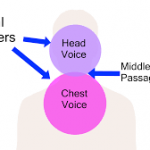Bespoke Vocal Coaching
The craft of vocal performance requires the mind and body to be trained to Olympic standards. True artistry requires a precise balance of all of the different systems of the body; breath management, primal sound, postural alignment, phonation, laryngeal and acoustic registration, and articulation. Training these sub-systems of voice efficiently takes time, practice, and expert mentoring from an experienced vocal coach to maintain peak performance. My lessons are based on this holistic, physiological and incremental approach.

My Teaching Philosophy
Whilst vocal talent is important to become an elite voice professional, with training and practise, everyone can improve their technique and become a better singer. An excellent technique facilitates: better range, power, resonance, flexibility and confidence. The voice is essentially a collection of muscles working in harmony, triggered by primal emotional intention; and like any muscle, it needs to be exercised and trained correctly to become stronger, predictable, and more efficient.
A lot of my work involves re-training singers whose previous training (private lessons, university courses, or conservatoire training) has not prepared them adequately for the singing profession or helped them advance in their chosen career path.
My passion for teaching also lead me to lecture in Voice Pedagogy at the Royal Birmingham Conservatoire and the Royal Northern College of Music.
A holistic, systematic approach to vocal technique is vital for any singer or teacher, who wishes to see dramatic improvement in their own or their students singing. I use incremental practical exercises on postural alignment, core stability, breath management, laryngeal and acoustic registration, resonance and articulation to allow you to become the best singer/teacher you can be.
Eventually most of my clients do not require a lesson every week, after a period of regular lessons, students begin to understand how their voice works and receive a bespoke practise schedule for me.
The end goal is to empower singers and teachers with autonomy; I do not encourage singers or teachers to become dependent on me or my teaching. The more their technique, understanding and performance artistry grows, the less they need regular one to one lessons. This is important as the demands of the professional life of a singer often does not allow them to work with their singing teachers regularly, mainly due to international travel and long contracts. Mentoring singers towards self-reliance, building their technique, and encouraging them to trust in it, often relieves performance anxieties and allows performs to truly enjoy their work.



